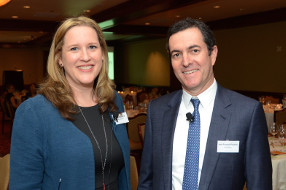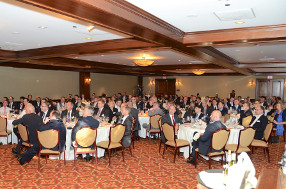Contact the team at FWB Park Brown to discuss your individual or company requirements, or to discover more about our specialist services.
Global Energy Leadership Dinner, Houston
30 July 2017
- Uncategorized
Global Energy Leadership Dinner Summary
Every year during OTC week, FWB Park Brown hosts a Leadership Dinner that brings together leaders and decision makers from across the globe, with the express purpose of examining some of the most pressing issues that the Oil and Gas industry faces.
In 2017, we invited Jean-François Poupeau from Schlumberger to share his thoughts on the pace of change in the Oil and Gas Industry.
The ensuing discussion around his address was held under the ‘Chatham House Rule’, and although participants are free to use the information received, neither the identity nor the affiliation of the participants may be revealed. Jean-François Poupeau has agreed to allow FWB Park Brown share some of the themes and observations discussed during the dinner.

Mary McIntyre and Jean-François Poupeau
Keynote Speaker Jean-François Poupeau
Executive Vice President Corporate Engagement, Schlumberger
Jean-François (JF) Poupeau is executive vice president Corporate Engagement, a position he assumed in May 2017. Poupeau is leading the ongoing corporate transformation project management office and is also responsible for corporate planning and development, stakeholder engagement, and communication.
Prior to his current role, he was executive vice president Corporate Development and Communication from 2012-2017; president of the Schlumberger Drilling Group, from 2010 to 2012; president of the Schlumberger Drilling & Measurements from 2007 to 2010; and vice president of Communication & Investor Relations from 2006 to 2007.
Poupeau joined Schlumberger in 1985 as a field engineer in the Gulf of Mexico. He has held operational and management positions in North America, Indonesia, Thailand, France, Nigeria and China. In 2004, he assumed the role of vice president of product marketing based in Houston, where he focused on the market positioning of the Schlumberger portfolio of advanced technologies.
Poupeau holds a bachelor’s degree in geology and a master’s degree in petroleum engineering from Tulane University. He is a member of SPE and SPWLA.
Discussion
Cautiously Optimistic
The general consensus amongst the participants was cautiously optimistic for the next 24 months, the view being that the Offshore business had tackled a high cost base and is now fit to thrive in a ‘lower oil price for longer’ environment. From the offshore Exploration and Production community the view is that capital projects and developments have been deferred to such an extent that future stocks of hydrocarbons cannot be guaranteed to be in surplus, even with abundant shale oil production.
The expectation is that demand for oil will grow in the next 24 months and will reduce the current surplus. However, the concern is that Shale producers will be quick to ‘fill the gap’ and that oil is now a highly price sensitive commodity in much the same way as pork bellies or corn.
The speed at which business models are changing is accelerating. During the initial phase of the current downturn, the focus was on short term ‘right sizing ‘and cost reduction activities. Faced with the prospect of a radically different economic environment and a ‘lower for longer’ oil price environment, business leaders have begun to accelerate the pace of change and therefore are restructuring their business models and supply chain strategies to fit the new business realities.
Leaders have accepted that the old ways of doing business are not efficient or profitable in today’s economic environment. As a result, we have seen a raft of consolidation, international mega mergers in the service business driven by desire to secure market share and a focus on achieving competitive advantage through more efficient supply chain practices and the adoption of new methods and technologies. Of course, this has led to further reductions in headcount; we have also seen the weakest competitors go out of business.
Slow gradual evolution of business models and practices is not the paradigm. Bold re-engineering has begun to happen. Throughout the industry, there is a growing realisation that collaboration and technology adoption are now the future. We have much to learn from other industries in that regard.
Changing business models and evolving operational models are integrating services from the service side which in turn opens a more robust suite of services to clients building in efficiencies and cost saving. From operator perspective, some are also integrating operations internally while others are bringing some services in house.
The impact of changing business models and cost reduction has had a major impact on the most important factor in our business, people. Change is difficult to manage; people naturally resist top down changes and find it hard to adapt quickly to new ways of working. Collaboration means a new set of behaviors and mindsets.
There was a significant concern that the Oil and Gas business may struggle to attract talent in the future, given that the industry has experienced such a dramatic downturn and that the public perception is that hydrocarbons are not the future of energy. Additionally, it was recognised that the next wave on entrants into the industry will have vastly different expectations in terms of career development and company cultures. Significantly, it was recognised that the industry has not done enough to ensure diversity – in particular gender diversity.
Conclusion
The pace of change is actually quite difficult for us to track, however during uncertain times the industry is adept at finding new ways to innovate and adapt. Collectively, we find a way to adapt and emerge fitter and more robust. New commercial models are being explored as a result.
*Bottom line – clients and vendors are finding new ways and new commercial terms to work together.
